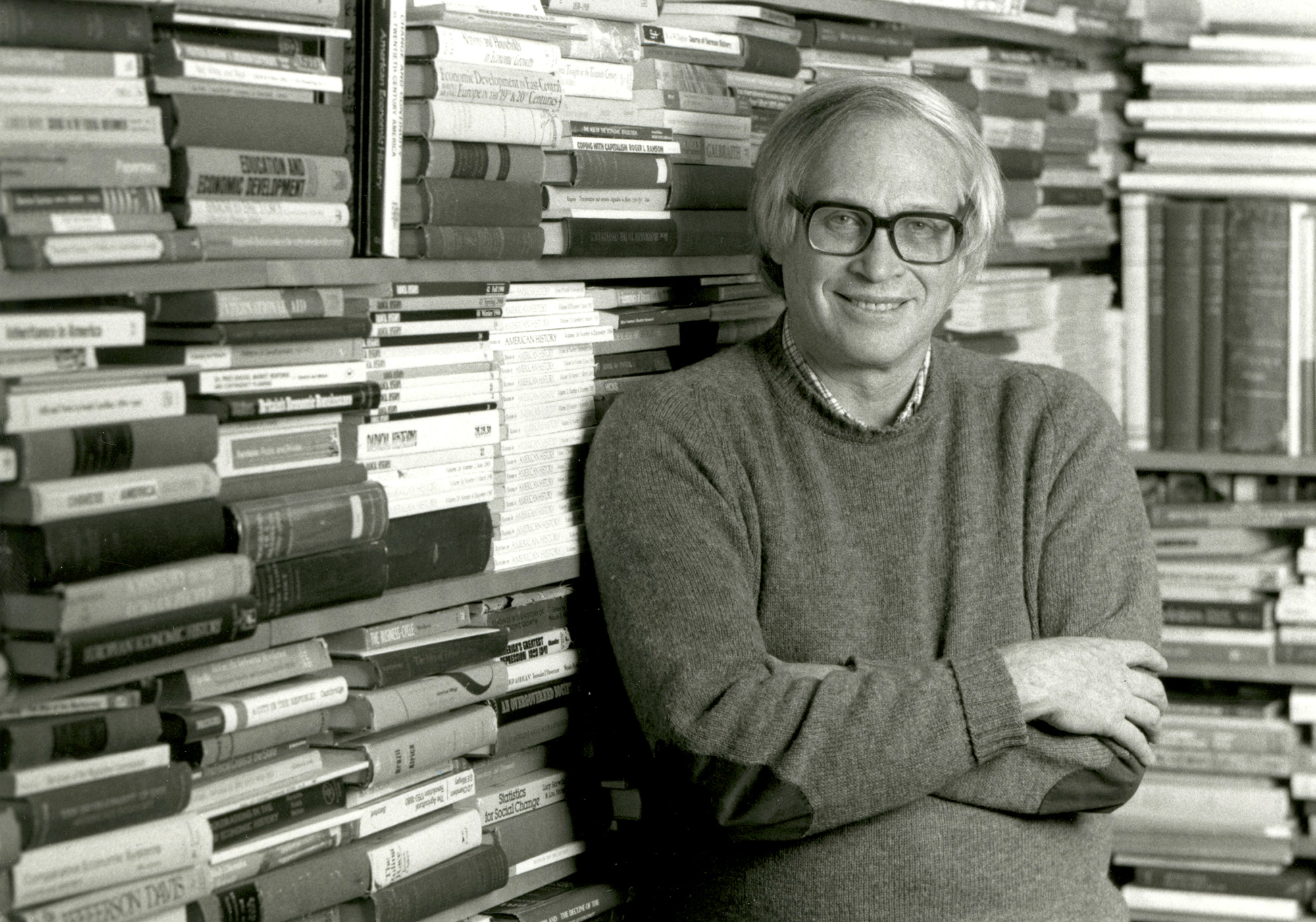The economist developed an international reputation for his work on the economic impact of institutions, most notably through his study of slavery.
Stanley Engerman, a professor emeritus in the Department of Economics at the University of Rochester, is being remembered by colleagues as an internationally recognized economist and economic historian. Engerman died on May 11 at the age of 87.
In naming Engerman a Distinguished Fellow in 2005, the American Economic Association praised him for making major contributions in economics and history as a researcher, editor, and teacher and for helping to increase the importance of economic history within the discipline of economics.
Engerman, who would become the John H. Munro Professor of Economics in 1984—a title he held until his retirement in 2017—and a professor of history, joined the Rochester faculty in 1963, shortly after earning his PhD in economics from Johns Hopkins University. Over the course of a career that spanned more than five decades, Engerman coauthored or coedited 17 books and more than 100 articles, while teaching courses on economic history and the economics of sports and entertainment.
Inaugural Stanley Engerman Lecture
Wednesday, September 20
3:30 p.m.
Hawkins-Carlson Room, Rush Rhees Library
The Department of Economics will hold the inaugural Stanley Engerman Lecture with speaker Claudia Goldin, the Henry Lee Professor of Economics at Harvard University. In conjunction with the lecture, a reception will be held to allow friends, colleagues, alumni, and students to remember Engerman and celebrate his many contributions.
A pioneer in economic history
Engerman’s most important work is widely considered to be Time on the Cross: The Economics of American Negro Slavery (Little, Brown and Company, 1974), coauthored with fellow economic historian Robert Fogel, who would go on to win a Nobel Prize. The book examines the economic underpinnings of American slavery, upending the conventional belief that slavery was not economically viable.
“One point that was destroyed by Time on the Cross was the idea that slaveholders kept slaves for prestige, rather than economic reasons,” says Joseph Inikori, a professor emeritus of history at Rochester who coedited with Engerman the 1992 book The Atlantic Slave Trade: Effects on Economies, Societies and Peoples of Africa, the Americas and Europe (Duke University Press). “Engerman and Fogel made it clear that slavery was a business enterprise centered on economics,” he says. As the authors explain in their book, “There is no evidence that economic forces alone would have soon brought slavery to an end without the necessity of a war or some other form of political intervention.”
Time on the Cross was noteworthy not just for its conclusions, but also for its analytical techniques. “Stan and Robert Fogel employed standard econometric techniques in their research, something that was typically not done at the time in analyzing questions of history,” says Michael Wolkoff, a professor of economics at Rochester. Engerman was instrumental in the development of cliometrics, the application of econometric techniques to the study of history. In honor of his contributions, the Cliometric Society named him a fellow in 2010.
Known for his extensive work on slavery, Engerman coedited a number of publications on the topic, including Between Slavery and Free Labor: The Spanish-Speaking Caribbean in the Nineteenth Century (Johns Hopkins University Press, 1985), British Capitalism and Caribbean Slavery (Johns Hopkins University Press, 1985), the three-volume Cambridge Economic History of the United States (Cambridge University Press, 1996), A Historical Guide to World Slavery (Oxford University Press, 1998), The Lesser Antilles in the Age of European Expansion (University Press of Florida, 1996), and Slavery (Oxford University Press, 2001).
While Time on the Cross is Engerman’s best-known work, Claudia Goldin, a professor of economics at Harvard University who worked with Engerman on the 1991 paper “Seasonality in Nineteenth Century Labor Markets,” says that his other great contribution was his impact on fellow economists. “If you check the papers that were published in the last 50-plus years, you will see thanks and acknowledgments to Stan in an extremely large number,” says Goldin. “Before we had the internet, we had Stan, and he was incredibly important to everyone.”
Among Engerman’s major contributions, explains Goldin, was his work with economic historian Kenneth Sokoloff, which included publishing a series of articles in the book Economic Development in the Americas since 1500: Endowments and Institutions. They developed what came to be known as the Engerman Sokoloff Hypothesis to explain why some countries have different economic growth rates. The duo studied 16th-, 17th-, and 18th-century historical data from the Western Hemisphere and attributed growth differences to initial levels of resources—including human capital—and inequality. Their research revealed that high levels of inequality within a society can lead to inadequate institutions that perpetuate low growth rates.
A generous colleague with an ‘encyclopedic memory’
Colleagues remember Engerman as patient and generous, with a remarkable depth of knowledge. “He was famous for this encyclopedic memory,” says Mark Bils, the Hazel Fyfe Professor of Economics at the University. “He had bookshelves everywhere, and all the books were double-stacked—behind every book was another book. If you asked him a question, he would go to the shelves, quickly pull out a book, and immediately turn to the appropriate page. It was amazing.”
Engerman didn’t hesitate to put his encyclopedic memory to use in helping colleagues. “Stan would read anybody’s paper and read it almost instantly,” says Wolkoff, “and he wouldn’t hold back on making corrections.”
In addition to Engerman’s generosity and achievements, Wolkoff was struck by his modesty. “Shortly before he passed, Stan thanked me for all he learned from me,” says Wolkoff. “I did all I could to keep from laughing, because whatever he learned from me couldn’t compare to what I learned from him. Yet he had the graciousness to make that statement.”
A career marked with honors
Among other awards and accolades over the decades, Engerman received a Guggenheim Fellowship, as well as fellowships from the National Science Foundation and the National Endowment for the Humanities. He was elected the Pitt Professor of American History and Institutions at the University of Cambridge for 1998–99. Along with being named a Distinguished Fellow of the American Economic Association, he was elected a fellow of the National Academy of Arts & Sciences. Engerman served as president of the Social Science History Association and the Economic History Association.
He is predeceased by his wife, Judy, who died in 2019. He is survived by his three sons—David, Mark, and Jeff—and his sister Natalie Mayrsohn.





